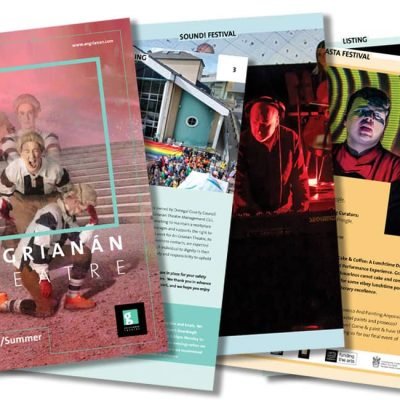Next Saturday 7 March 2015 we have the acclaimed stage adaptation of James Joyce’s iconic novel A Portrait of the Artist as a Young Man. It comes from director Jimmy Fay (The Seafarer) and was produced by The New Theatre Dublin and Richard Ryan. Featuring a cast of five, this production makes full use of the stream of consciousness narrative that Joyce is famous for.
A Portrait of the Artist as a Young Man was James Joyce’s debut novel, published when he was 34. Strongly autobiographical, it recounts the religious and intellectual awakening of Stephen Dedalus, his fictional alter-ego. First published in 1916, A Portrait of the Artist unleashed the incredible power of Joyce’s innovation and unconventionality upon the literary world in what was a remarkable reworking of the standard coming of age story. It mirrors the author’s life up to age 20, when he left Dublin for Paris, challenging attitudes to family, homeland, and the Catholic Church.
The early years of Stephen Dedalus’s childhood is recounted at a vocabulary level of Stephen’s own as he grows, in a voice not his own but sensitive to his feelings. The audience experiences Stephen’s fears and bewilderment as he comes to terms with the world in a series of disjointed episodes. Growing up against a background of Irish nationalism, Stephen is intellectually gifted but ostracised at school. He goes through phases of religiosity while also seeking out more sensual pleasures, squandering a school prize on visiting prostitutes.
This production received public and critical acclaim during its 2014 Irish and Paris Tours.
‘imaginative and graceful…Jimmy Fay’s direction of this in-house production at the New Theatre in Dublin plays a great part in the success with its quirky and highly visual approach.’ Emer O’ Kelly, Sunday Independent
Here is some background information on this iconic novel:
Once upon a time and a very good time it was there was a moocow coming down along the road and this moocow that was coming down along the road met a nicens little boy named baby tuckoo …
His father told him that story: his father looked at him through a glass: he had a hairy face.
He was baby tuckoo. The moocow came down the road where Betty Byrne lived: she sold lemon platt.
—James Joyce, Opening to A Portrait of the Artist as a Young Man
The early youth of Stephen Dedalus is recounted at a vocabulary level of Stephen’s own as he grows, in a voice not his own but sensitive to his feelings. The audience experiences Stephen’s fears and bewilderment as he comes to terms with the world in a series of disjointed episodes.
Stephen attends school at Jesuit-run, Clongowes College where the apprehensive, intellectually gifted boy suffers the ridicule of his classmates while he learns the schoolboy codes of behaviour. While he cannot grasp their significance, at a Christmas dinner he is witness to the social, political, and religious tensions in Ireland involving Charles Stewart Parnell that drives bitter wedges between members of his family, leaving Stephen with doubts over which social institutions he can place his faith in.
Back at Clongowes, word spreads that a number of older boys have been caught “smugging”; discipline is tightened, and the Jesuits increase use of Corporal Punishment.
Stephen is strapped when one of his instructors believes he has broken his glasses to avoid studying; prodded by his classmates, Stephen works up the courage to complain to the rector Father Conmee, who assures him there will be no such recurrence, leaving Stephen with a sense of triumph.
Stephen’s father’s debts see the family return to Dublin and Stephen realises he will likely not return to Clongowes.
Thanks to a scholarship obtained for him by Father Conmee, Stephen is able to attend Belvedere College, where he excels academically and becomes a class leader.
Stephen squanders a large cash prize from school, and begins to see prostitutes, as a distance grows between him and his drunken father.
As Stephen abandons himself to sensual pleasures, his class is taken on a religious retreat, where the boys sit through sermons; Stephen pays especial attention to those on pride, guilt, punishment, and the ‘Last Judgement’.
He feels the words directed at himself, and overwhelmed comes to desire forgiveness.
Overjoyed at his return to the Church, he devotes himself to acts of repentance, though they soon devolve to mere acts of routine with his thoughts elsewhere than on spiritual matters.
His devotion comes to the attention of the Jesuits, and they encourage him to consider entering the Jesuit priesthood.
Stephen takes time to consider, during which he has a crisis of faith, a conflict between his spiritual beliefs and his aesthetic ambitions.
Along Dollymount Strand he spots a girl wading, and has an epiphany in which he is overcome with the desire to find a way to express her beauty with his writing.
While a student at UCD, Stephen grows increasingly wary of the institutions around him—Church, school, politics, and family. In the midst of the disintegration of his family’s fortunes, his father berates him and his mother urges him to return to the Church.
An increasingly dry, humourless Stephen explains his alienation from the Church and the aesthetic theory he has developed to friends, who find they cannot accept Stephen’s positions.
“I go to encounter for the millionth time the reality of experience and to forge in the smithy of my soul the uncreated conscience of my race.”
Source: http://www.thenewtheatre.com/tnt_php/scripts/page/spare1.php?gi_sn=54d8d4d2a176f|0



